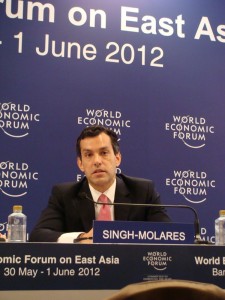Widgetized Section
Go to Admin » Appearance » Widgets » and move Gabfire Widget: Social into that MastheadOverlay zone
Alcatel-Lucent Urges Asian Nations to Close Growing Infrastructure Gaps at World Economic Forum on East Asia 2012
Thailand’s US$2.6 billion ‘Smart Thailand’ strategy is an example of government commitment to building competitive digital economies

Bangkok, 5 June, 2012 – Alcatel-Lucent (Euronext Paris and NYSE: ALU), a leading global innovator in the field of networking and communications technology said Asia will need to invest USD 1.1 trillion in its telecom infrastructure to compete in the digital economy. Alcatel-Lucent delivered the message at the World Economic Forum on East Asia 2012 in Bangkok.
Over the past five years, Asia has added 1.5 billion additional mobile subscribers, and 37 fixed broadband subscribers . Yet more than 25 percent of Asians live without basic mobile services. Over the next five years governments and business will need to add another 1.3 million mobile subscribers to bridge the gap. What’s more the networks will need to support high-bandwidth services like video and a growing urban population.
Urbanization in most Asian mega-cities is increasing at an unprecedented speed — manifested by the largest mass migration in human history, which in turn is straining infrastructure, social services, schools, and the environment. National Broadband initiatives are required to support urban growth and connect rural locations to the global economy. Many Asian governments understand the needs. Asia Pacific is home to 12 national broadband projects. They aim to make affordable high-speed broadband and wireless services universally accessible for people to compete and survive in a global economy.
The extent of those projects varies. While Singapore and Malaysia are already providing world-class telecom services, a huge infrastructure gap exists between them and nations like Cambodia, Myanmar, and Vietnam. In Myanmar, for example, only 1.3% of the population currently subscribes to mobile voice services, compared to the neighboring nations Laos (80%), Thailand (111%), and Malaysia (127%).
“A policy that combines application strategy, network infrastructure, and affordable business models will provide 36% more GDP growth than a network only approach. To bridge the infrastructure gaps in Asian nations, smarter planning and cross sector collaboration are needed,” Mr. Rajeev Singh-Molares, President of the Asia-Pacific Region for Alcatel-Lucent said.
According to Mr. Singh-Molares, “Digital infrastructure is an imperative for nations that want to compete in the digital economy. Thailand is a good example of a country that understands this.”
The Thai government has a US$2.6 billion ‘Smart Thailand’ strategy. The strategy combines a network build with a push to convert all 800 or so government services onto digital platforms and make its cities and provinces smarter. The network build is ambitious. It aims to change the number of Thais connected to a network from 33 percent today to 95 percent by 2020.
Alcatel-Lucent believes initiatives like Thailand’s are important to bridging the infrastructure gap that divides developed and developing nations in Asia.

You must be logged in to post a comment Login